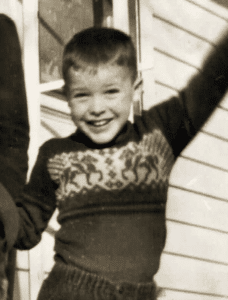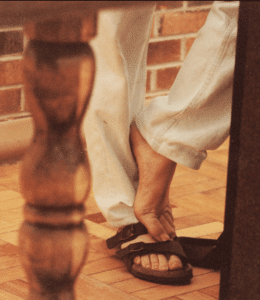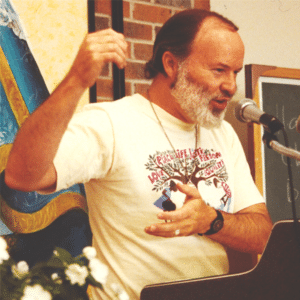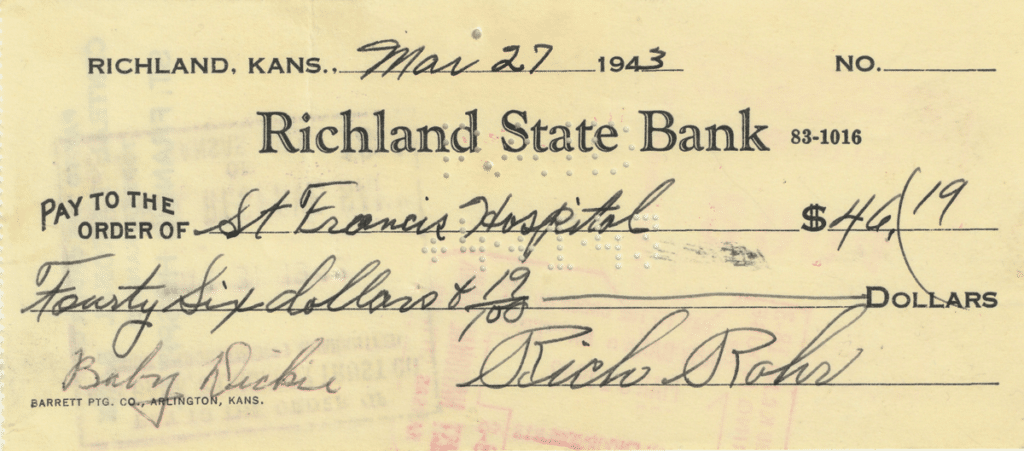
Thisness
75 Years of Life
Tuesday, March 20, 2018
(Spring Equinox)
I was born 75 years ago today. I know 75 is a somewhat arbitrary number, yet our culture has assigned it some significance. CAC staff encouraged me to share my journey, and they sifted through old photo albums to illustrate my very human path. So today I offer a few reflections from my own “particular” life. I hope you, too, can see in your life your own unique manifestation of the image and likeness of God, each of us “crying what I do is me: for that I came” in Gerard Manley Hopkins’ words.
In 1943, in the midst of World War II, it cost Mom and Dad exactly $44.19 to birth me at St. Francis (auspicious!) Hospital in Topeka, Kansas. The immediate circumcision then cost another full $2.00. I received my first initiation rite very inexpensively indeed! It seems like Mom was much more initiated than I was in her many hours of labor.
My parents laminated the check they wrote to pay the bill for my birth; I still have it and look at it with soft joy. The entire amount—$46.19—covered a week in the hospital, during which I had full nursing and cuddling privileges from Mom and extracurricular care from a whole staff of Sisters of Charity in angelic white habits. No wonder I am so spoiled and like to think I am God’s favorite!
Daddy wrote at the bottom of the check “Baby Dickie.” He did not want me called Junior, since he had given me his own name of Richard. So I was always known as Dickie at home and by close friends throughout the years.
I had a very happy boyhood in Kansas—right down the road from Dorothy and the Wizard of Oz—building forts, rafts, and treehouses. I spent idyllic summers on my cousins’ farm in Ellis County, which was boring flat land to most people. There I first learned to love and honor animals.

I was a “B” student in school because I usually wrote down my thoughts rather than what the teachers actually said. This was even more true at Duns Scotus College in Michigan where I studied philosophy for four years and at St. Leonard College in Ohio (affiliated with the theology department of the University of Dayton). My young Franciscan professors had brought back the latest biblical and theological scholarship from European universities. Many were in Rome during the momentous Second Vatican Council, and they passed onto their pupils what they learned and experienced. We were not so much taught theological conclusions as the process of getting there. I received a full history of the development of Christian ideas more than Catholic apologetics.
Little did I imagine how this would affect my entire life and my own approach to theology. The inspired documents of Vatican II put the Gospel back at the center of our lives, just as St. Francis tried to do. This made spirituality so much more alive and real than the narrow churchiness I grew up with—and that many are still taught to this day. After the fearful reaction to Vatican II in these past decades, I’m grateful to have lived to see Pope Francis, who convinces me of the wonderfully crooked lines of God. How did he ever get elected? Pope Francis is showing us all that God’s full life, just like nature, is never a straight line and never a dead end.
I was ordained in 1970 in my home parish in Topeka. The church was built on the spot where the Pentecostal movement began in 1900; the first recorded modern phenomenon of speaking in tongues was heard there on New Year’s Eve of 1901. The old mansion was soon called “Stone’s Folly” and the Pentecostals left Kansas for Azusa Street in Los Angeles, where folks were more accustomed to other languages than English. Images from the first Pentecost (fire, which no one controls, and wind, which seems to come from nowhere) reveal the wildness of the Spirit that has guided and driven my life—with plenty of resistance on my part—all of these wonderful years.
A woman held up the receiving line after my ordination ceremony to tell me a local Pentecostal story. I was irritated; she was interfering with my centrality and many others were in line. I tried to hurry her along, but nevertheless she persisted. And by she, I mean both this particular woman and the Holy Spirit—who has never given up on me. The Spirit has always persisted in drawing and pushing me, despite my many personal limitations, my unfaithfulness with what was given to me, and the many times I passionately believed my own message while also denying it in practice.

This one Holy Spirit has moved through all of us over time—creating the Franciscans and the Second Vatican Council for Catholics, the Baptism in the Spirit for many Protestants, deep mystical movements in all faith traditions, and a growing recognition, as St. Thomas Aquinas often wrote, “If something is true, no matter who said it, it is always from the Holy Spirit.” [1] In time, I could not help but see the many faces of Christ and the Spirit in serene Hindus, native peoples in love with the natural world, my socially conscious Jewish friends, profound Buddhist wisdom, Sufi God-lovers, and, of course, in loving Catholics, Orthodox, and Protestants of every stripe, often in spite of their denomination or theology rather than because of it.

This is entirely true for you, too. I know you are part of this same windstorm, this same seeing, or you would not have bothered to read this short memoir. I am so glad that we have been on this same earth at this same wonderful and terrible time. I humbly thank you for your trust.
Reference:
[1] Thomas Aquinas, De Veritate, q. 1, a. 8. The statement “Omne verum, a quocumque dicatur, a Spiritu Sancto est” was used repeatedly by Aquinas; he gave credit for it to Ambrose, an earlier Doctor of the Church.
Essential Teachings on Love:
We are delighted to commemorate Father Richard’s 75th birthday with a new book in collaboration with Orbis Books. Drawing largely from his 2016 Daily Meditations, this collection shares many of Richard’s core teachings on Love. Interwoven with a personal interview, the writings illuminate a lifelong journey of growing in love—a journey open to all who are willing. Experiences from Richard’s life, both joyful and sorrowful, illustrate how the path has unfolded for him and how we each might come to know Love more intimately. Richard Rohr: Essential Teachings on Love is now available at store.cac.org.
Sharing Transformative Teachings:
In lieu of gifts or greetings, we invite contributions to the Center for Action and Contemplation’s scholarship fund. (Might we suggest a gift of $75?) Thanks to your support, we are able to offer scholarships for the Living School, online courses, and conferences. You may donate securely online at cac.org/75-year-scholarship-gift or write a check (USD only), payable to CAC, and mail to PO Box 12464, Albuquerque, NM 87195.




